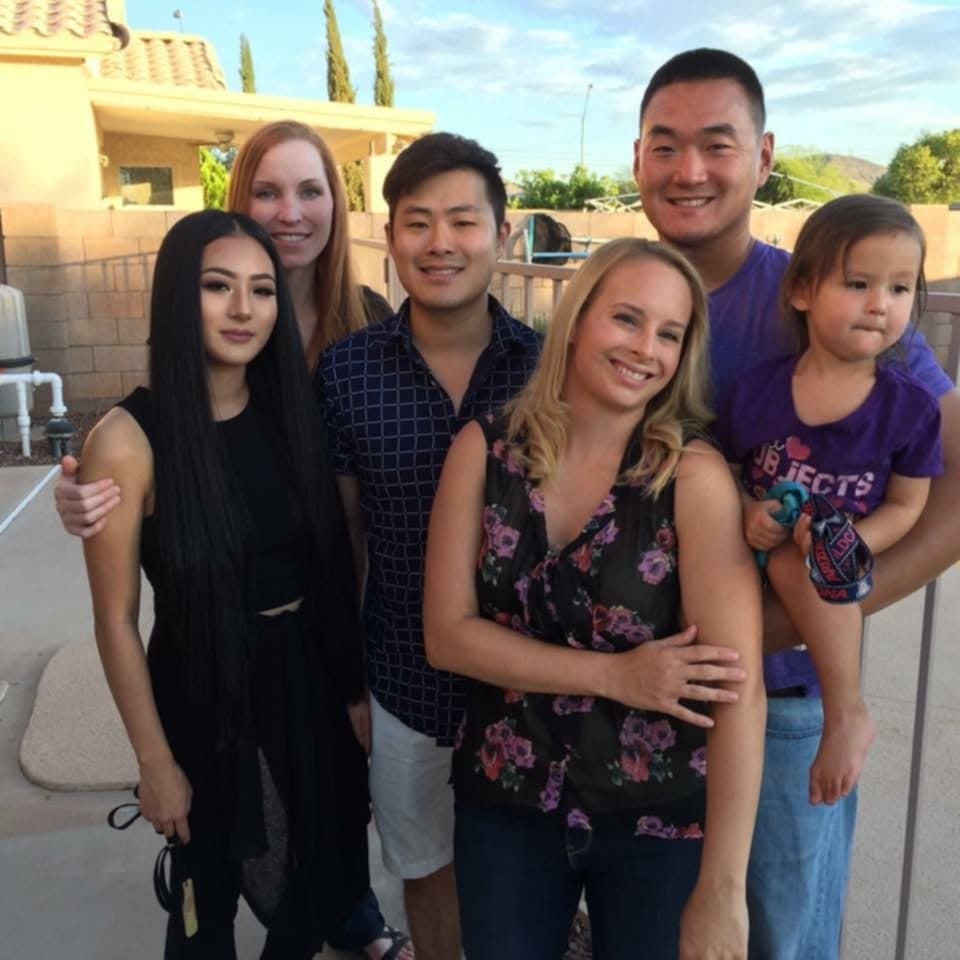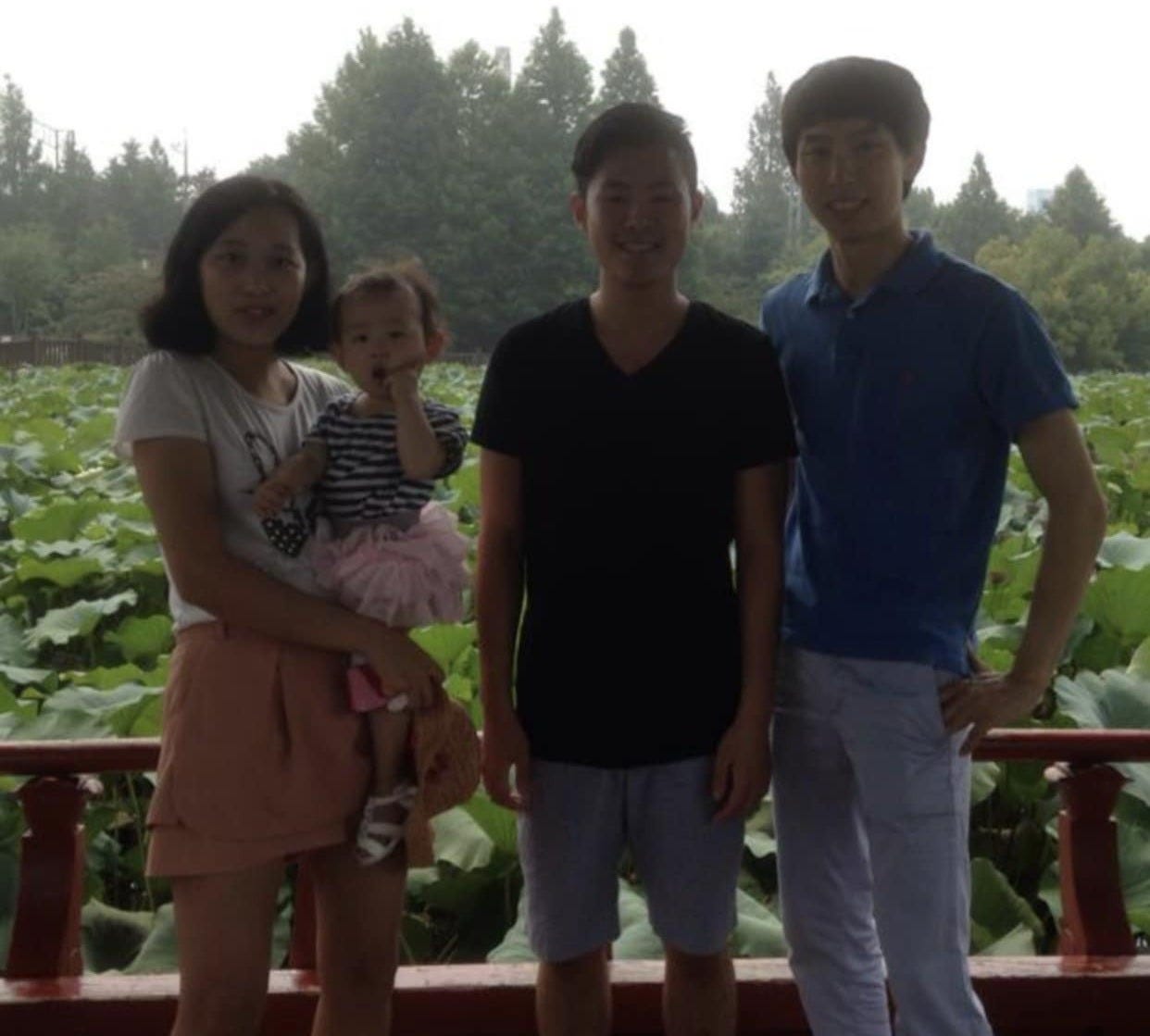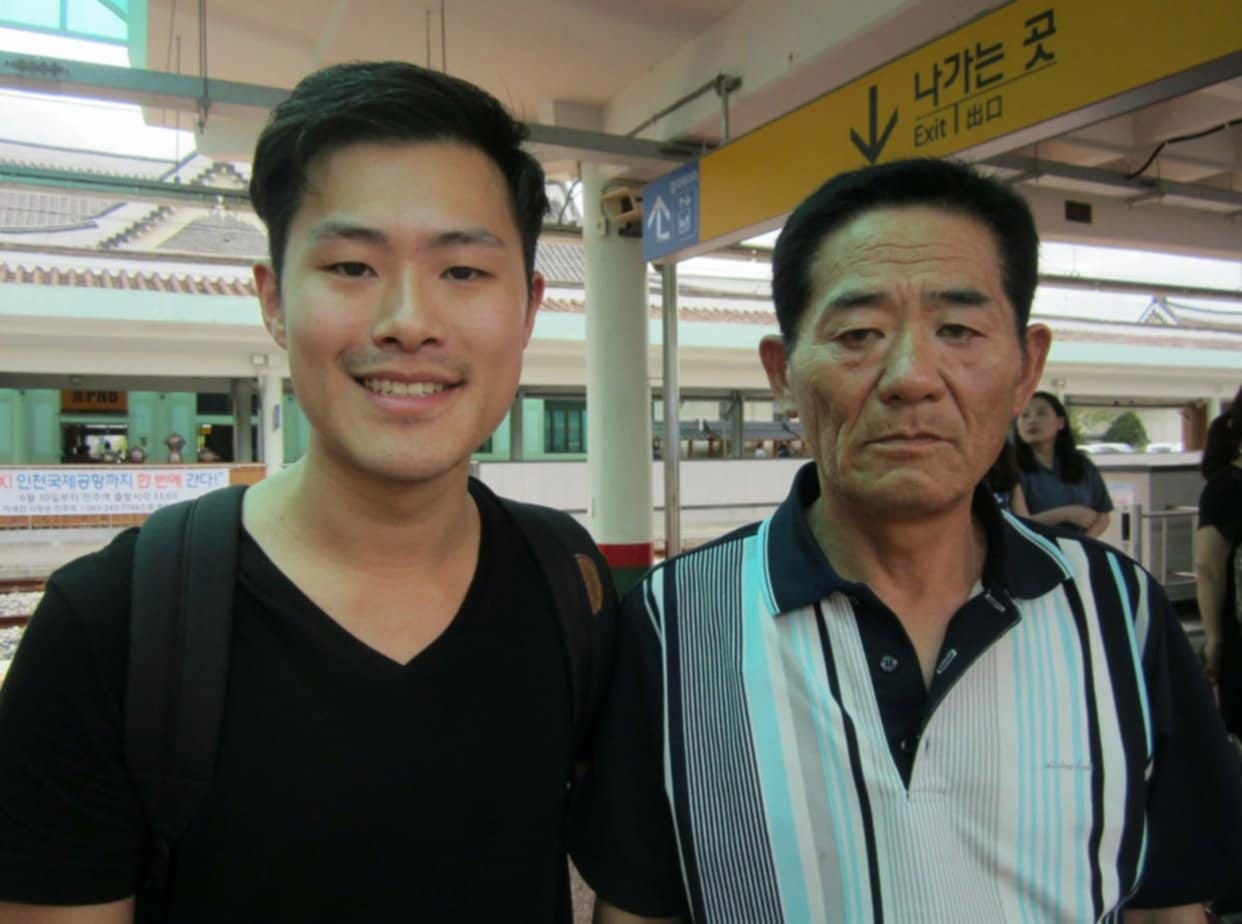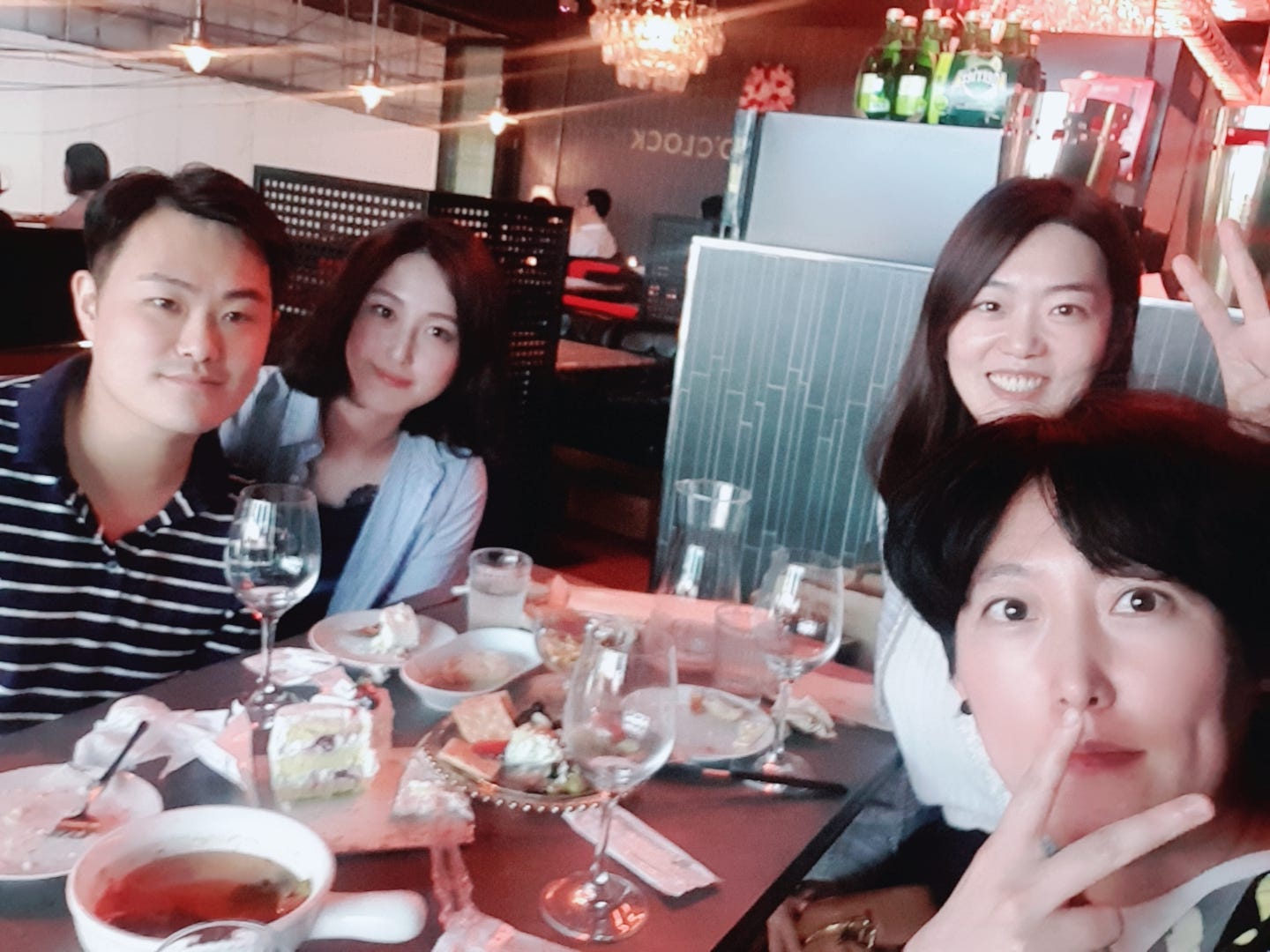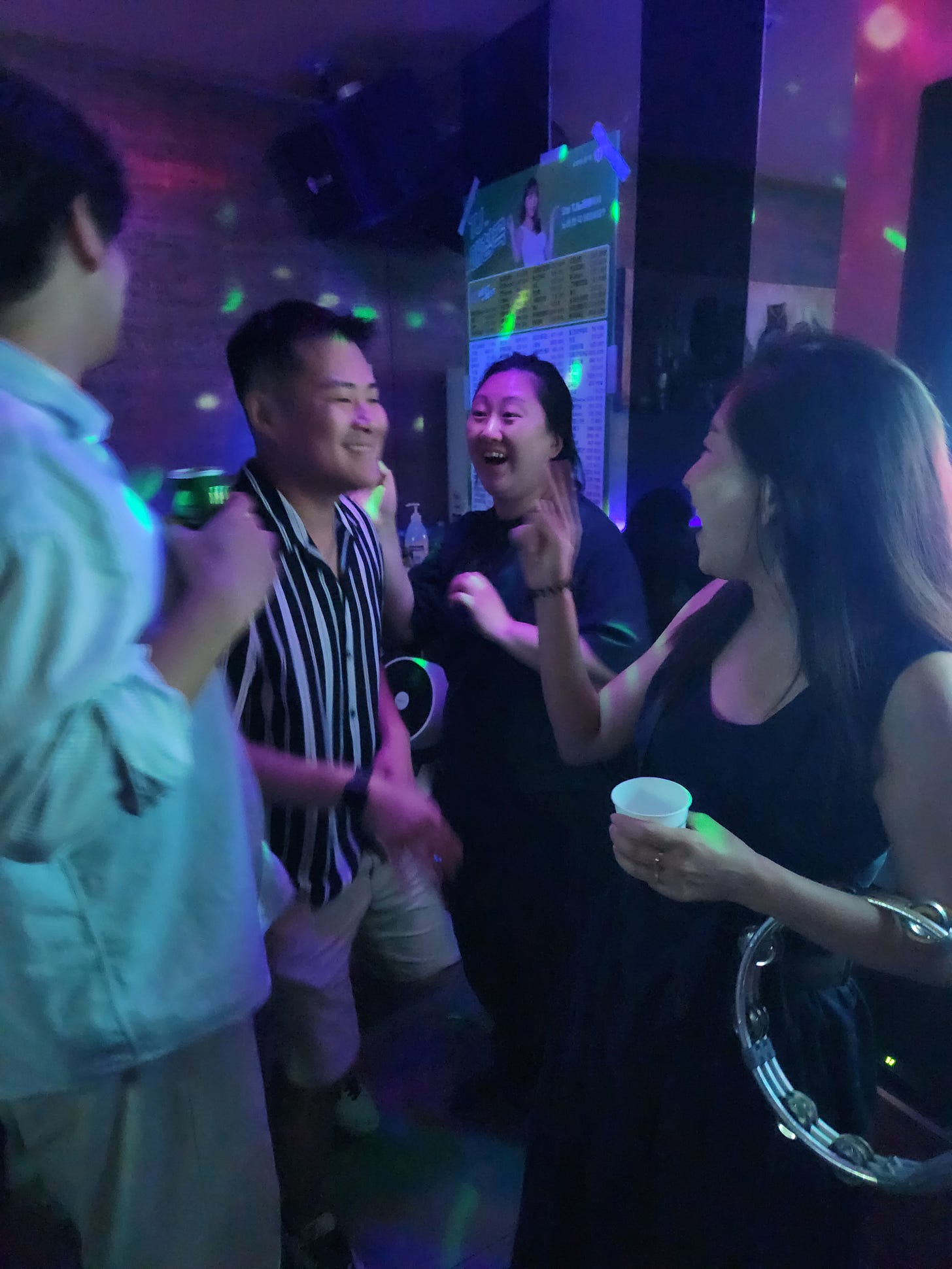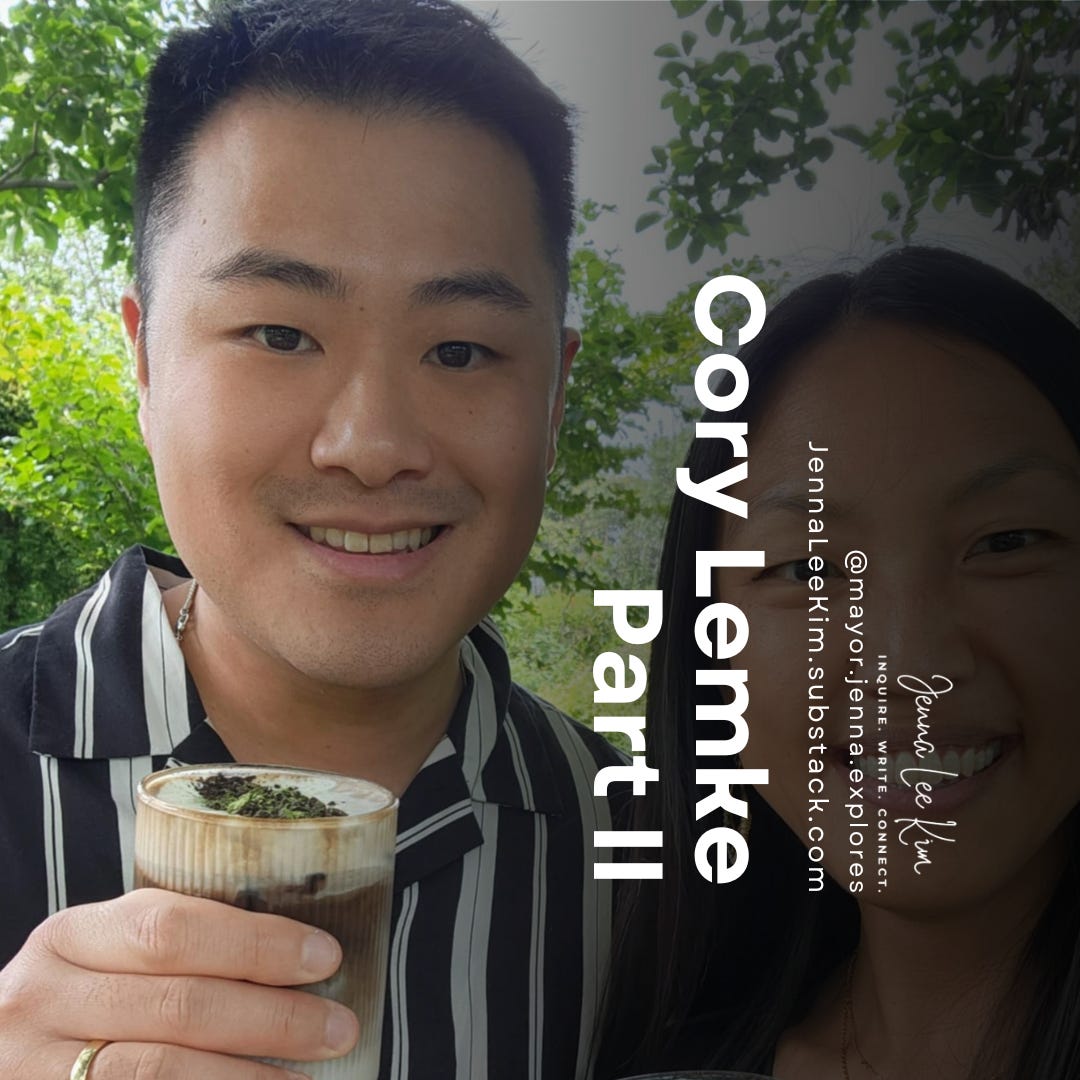Exploring with Cory Lemke, Part II
Part II of my Q&A with linguist, scholar, Korean adoptee, and personal bestie
Check out Part I of my interview with Cory Lemke Here!
…
Where do you think you’re at in your identity journey?
I'm 34, <Laughs>
I’ve been told I have 34-year-old energy.
I love that.
Where do I think I am in life? Yeah, I don't know. I feel that there's an overlap with language there. Like, we're never done learning language. And I think that's both demotivating and motivating at the same time. It's like, I have to learn this forever. But it's true, you know? I try to live my life. I take a lot of trans Pacific flights and I always think, like, if this plane crashed, would you have any regrets? Morbid, but I think about that a lot, because there've been a lot of plane crashes around me in the past year. If you died today, would you have any regrets? If you were on that mountain and the universe was like, Welcome to heaven! Do you have any regrets? Do you want to go back as a ghost person? I'd be like, No, I did everything I could and I got pretty far. And I'm happy with that success. I'm very proud of that.
It is an ongoing journey. But, you know, I think that's a new mantra. And where I'm at in my life is try to live with no regrets, right? And try to do what your heart tells you and let that be your guiding path. What I would say right now is: I don't feel Korean American. I feel Korean and American and I think that's a key difference between us and other Korean American folks.
We are part of the diaspora. That's not to downplay that, you know, but I really do feel like when I come back [to Korea] and I'm just sitting there eating bread, talking to Koreans about their jobs, I don't feel Korean American. I feel American in that situation. When I'm with my partner, and we're talking about just, you know, what it's like to be a PhD student, I feel American in that situation. And then vice versa, when I'm in the states and my friends are asking me, what did you do this summer? I don't feel Korean American. I feel Korean. Like, Oh, I was on a mountain bowing to my ancestors, and it was hot and awful. It was so humid. But, you know, it's what you do, because it's culture. It's just what you do. So, in that way, yeah, I feel in between being Korean and American. I think that's the beautiful thing, like it is a third space, but it is a different third space from being Korean-American.
There are things that really tie us to this land. And, you know, it is a different immigrant experience from the Korean American experience.
In terms of my racial, ethnic identity, I really feel both, not the mixture of the two, even though I think in the day-to-day life, it is a mixture of both cultures.
What’s been the biggest lesson, theme, or take away you can apply to the journey?
Well, you know, we are standing on the shoulders of giants, because by the time I was studying abroad in China, Language of Blood was out, you know. And there were podcasts, there were blogs on iTunes about coming back to Korea to live and what it means to be a Korean, adopted person living in Korea. So, we had those resources, you know. We could begin processing before departure, so to speak. Whereas I think, if you were an adult person in 1995, you didn't have Language of Blood. You had that one movie that everyone had watched, I guess. We had resources. This work is so incredibly important, as well, because we just don't know who is going to come after us and who's going to make meaning of their identity based on this work. So, kudos to people like you, Jenna.
Ugh, well, thank you, but the work you do is so important. It’s going to give real answers to people about their origin and their lives. You’re such an incredibly good, smart critical thinker who really cares about our community.
Oh, oh, wow. Oh, that's so sweet. I don't know if I’m critically thinking or like, drinking my way through it. <laughs>
I think it's like, yeah, and not to be “that” linguist that has to beat the drum all the time about the importance of our field, but I'm a language teacher, right? And one of my favorite things is when you get the student that comes to you and they're like, I want to improve my speaking, and I'm like, I love that. Okay, let's do that. I love helping people improve their speaking and over time, very quickly, I think what we realize is: Oh! You don't have a problem with your speaking as much as you do with your listening. People have this realization that having a conversation is half speaking, half listening.
I think learning another language really forces you to listen on a very deep level that I don't know that we always do in our dominant language, right? We kind of go on autopilot a lot of the time waiting for our turn to speak, but when you can't understand everything that they're saying, you really have to hyper focus. And I think that's a very difficult skill for a lot of people. We realize half of the conversation is listening.
It's the same thing, I think, with being adopted and the story is: We're so, so eager to tell our story. We're so excited to speak. I want to improve my speaking. But what we don't often do is listen. We don't listen to each other all the time. We don't listen to other Korean people and what they're saying about their pain and how their pain is related to our stories.
We don't listen to the other stakeholders in the trio, you know? Well, that's not true. We do listen to the adoptive parents a lot, because, you know, their voices apparently matter more than everybody else's. Sarcasm, if that wasn’t clear.
I think that has been the big takeaway for me in this whole thing. I realized that reunifying with my biological family, my first family, I learned, Wow. This is not just my story. This is our story as a family. I lost my (birth) mother, but my uncle lost his sister, and they lost their aunt. You know, that was so incredibly humbling listening to how they framed it and their narratives. I'm just one character in this larger, larger narrative. And so I think the final takeaway there is that we stand to gain so much from listening to the other people in our story, the other characters in our story.
What’s been the biggest surprise?
Probably the food and that my <Korean> family loves eating organs. <laughs>
They love it. <laughs again> They love it. Every meal is like, Oh, here's a kidney. I'm like, Thank you. So like, I just went down to do funeral services and a sendoff for my mom, right?
We did. We went up the mountain, we did the bows, and then after the mountain, dinner was literally, like, blood sausage. My sister-in-law looked at my brother when we got back to Deajeon and she's like, Okay, wait a minute. Your kids didn't like this meal. And <your brother> is from America, and was like, picking at the meal. Like, you have to manage the relationship! You have to know these things. You have to think about other people!
It was so funny to just like, watch her nag her husband, and it didn't cross his mind at all.
So, yeah, okay. The question is, what surprised me the most? I think it's the theme, you know. I joke about the food thing, but like, I think it’s more culture shock, right? That's a very real, tangible thing, I think, that people can relate to.
I think the biggest thing - it sounds silly - but it's continuing what I just said. That this story wasn't all about me, you know. And I think that's where I was in life at the time: a young 22-year-old is learning that this world is not about me and even this story - my story - is not only about me, that we all collectively have been impacted by schizophrenia in our lives, and these are just the different ways it manifested. And we all love each other so much.
I think, you know, because of that, that we can find love in pain. There's just so many layers to it, you know. And I just think it's incredibly beautiful. It's very, very sad, but it can also be incredibly rewarding. I think if you do the work, if you show up, you’ll learn this, too.
People who are afraid of that, of opening that Pandora's box, and I hear it all the time. “I'm not going to do a birth family search because of what I experienced with my family in the United States, or what I think my family is going to be. It's never a good story, right? Like, there's always a reason we were adopted and the chances of us being the heirs to Samsung is very, very slim. It's not going to be a Disney princess story. It's a Korean adoption story. The risk of pain is very, very high, but we stand to gain so much by embracing the pain and learning from it.
And what we can get from that, I think, outweighs the monotony of the work.
What’s been the biggest challenge or hurdle?
Language. Language is everything, though, right? Like you knew the Adoptee Linguist was gonna say that, right? It is. It's because there's the language and then there's the subtext of what people are saying and how they’re trying to manage relationships - real, very real relationships - in the language that you have lost, and the pain and the work that comes with trying to get back what you've lost… and then learn what language you didn't get after that… it's been very challenging. And it does. It does wear you down. It is a constant reminder of everything that you've lost.
But again, you know, it wouldn't be a Korean experience if there wasn’t an immense amount of pain and suffering. So, you know that is what it means to be creative. It’s to be beat down, get back up, and continue taking it. You get stronger. You grow these calluses and you get stronger. It's resiliency and persistence. If we must have han by virtue of our births, let’s let it make us stronger. And who knows? You might learn something about being human in the process.
What has brought you the most joy?
What has brought me the most joy is also language and everything that comes with it. I know. I'm just beating a dead horse. It’s true. But it's just so cool. It is the other adopted folks that you meet along the way, the other Korean people that you meet. And just, you know, I have a very good Korean friend and I'm meeting him on Friday for a drink. And he just never thought about <adoption and our experience>.
It's the same with being LGBTQ. You know that people like that exist. You know, statistically, your chances of meeting a person like that are low and then when you finally do, you're like, Oh, wow. Okay, I never thought about how your life is different, and the way you think about things is different, and the way you experience things is different because of your positioning in society. So, I just think it's been so incredibly rewarding: meeting people and learning how they think about it, and, you know, impacting each other on that level.
I don't know, I know you probably wanted something better <laughs> but meeting people is what brings me the most joy. I don't know what that means. I've been sharpening these skills for many years. I'm like, that speech went bad. <laughs> That was poorly crafted, am I right?
No, I think that’s why you and I connected so quickly and so well. We are both lovers of people.
What does belonging mean to you? What does it mean to belong?
Belonging means that you can get away from belonging.
Personally, I don’t like belonging. My life has been: NOT belonging.
I know how to do that identity. Belonging? That’s not who I am.
I'm a queer person of color. So much of my story has not been about belonging. I want to feel like I don't belong. I’m comfortable there.
Knowing you, that response makes a lot of sense to me. I think it’s why and how you’re able to make other people so comfortable. You are comfortable being you no matter what situation you’re in. People can feel it. You’re a gift.
Where do you feel you belong?
I belong everywhere.
Questions? Comments? Leave a comment here and I’ll respond to it on my Spotify Podcast: Exploring with Jenna Lee Kim in an “unplugged” and unscripted way! You can also email me at jenna.tae.hee.kim@gmail.com

